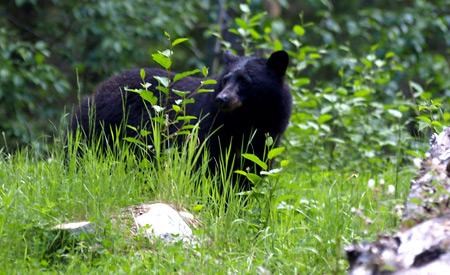It is spring on the coast and with the sight of blossoming cherry trees and the sound of returning geese comes the knowledge that after a long winter of hibernation bears are waking up hungry and looking for food.
In 2011, the last year statistics are available, BC’s Conservation Officer Service received almost 21,000 bear complaints that resulted in more than 600 bears being destroyed for the protection of the public due to perceived or actual threats to human safety.
People quickly teach bears bad habits by allowing access to garbage and human food stuffs, said Conservation Officer Andrew Anaka. “People can take many precautions to prevent bears from becoming habituated to humans,” he said. “First, never make a bear feel welcome. If you see a bear, from a safe location, make it feel uncomfortable by yelling, honking horns, banging pots or using commercially available bear bangers.”
Next, never leave garbage available, Anaka added. “Store it indoors until pickup. If you double bag, you’ll never notice the odours.”
Additionally, people need to take down their bird feeders. “Next to garbage, bird feeders are the next major attraction for bears,” Anaka said. “Spring is here and there is plenty of food available for birds. They don’t need to be fed.”
Barbeques, pet food and chickens are the next most likely attractants. “Bears are attracted first to chicken feed and then the chickens,” said Anaka. “Keep your chicken food secure and your chicken coops strong. We have a brochure to assist people with reducing the lure of chickens as bear food, which is available at our office. Chickens and chicken feed are pretty attractive to bears in the spring when natural food sources are in short supply and still developing.”
A bear that has grown accustomed to eating human food or garbage is more likely to present a future danger to the public. Conservation officers are often forced to destroy bears that have become food conditioned. “The adage, a fed bear is a dead bear, is unfortunately all too often true,” said Anaka.
Conservation officers are focusing on educating the public in order to reduce human/bear conflicts. “We are asking the public to help keep bears wild by not feeding bears, even if it is unintentional, and making bears unwelcome in our community,” Anaka said. “We also partner with Bear Aware, which concentrates on reducing bears’ access to food sources by educating the public.”
Readers who are seeking advice on reducing bears’ access to non-natural food sources should contact Powell River Bear Aware at 604.223.1170 or by visiting the program site online. To report conflict with wildlife or to report a violation, readers can call the Conservation Officer Service 24-hour reporting line at 1.877.952.7277.



